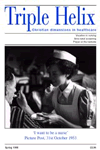Roger Thayne OBE is chief executive, Staffordshire Ambulance Service NHS Trust. He joined the army at 15 and worked his way up to the rank of Colonel. During the ambulance dispute of 1989-90, it was his job to co-ordinate military ambulances on the streets. He was a medical planner in the Gulf War, going out at the end of hostilities to bring the hospitals back. He has four grown-up children. Baptised as a Roman Catholic, Roger went to a Methodist Sunday school, and now worships at the local Anglican church.
Trust HQ is on the outskirts of Stafford, and is also the ambulance depot. It's overcrowded, with Portakabins and parking problems. Unlike hospitals, which reduce their staffing at night and at weekends, the ambulance service never stops. Roger's first task in the mornings is to sort out the problems of the past 24 hours. He makes it his business to walk around, talking to crews or control room staff, ensuring that the trust and its 500 staff give the best possible service within the resources available.
There is a high level of satisfaction when everything goes right. 'There aren't many jobs where you can say our organisation has saved one or two lives today.' There is an equally high level of stress. Roger believes this can be dealt with by good organisation. He keeps an eye on staff and expects his managers to do likewise. Stress can be minimised by firm decisions, by giving support, by being polite, by saying thank you, by allowing the odd mistake.
Ambulance personnel can come through horrific experiences, yet be stressed out by a seemingly minor incident. One of the most difficult experiences is comforting an elderly person devastated by the death of their partner. A good ambulance controller can recognise stress from a crew member's voice. 'Get them in off the road, give them a cup of tea, talk to them', says Roger. 'We see life and death in sharp focus and we need to understand the pressures on the staff.'
Roger believes the New Testament is one of the best management text books. 'Leadership is about how to manage people - with honesty, truth, care and compassion. Loving your neighbour as yourself means treating patients and staff as you would wish to be treated.'
The powers that be do not always want their chief executive to be honest with the public. 'But we are a public service; we should tell people what we can do and what we can't, and do our best to deliver what they expect.' The worst element is having to be honest with people who may be in the wrong appointment and have not achieved what they should. 'We in the ambulance service believe very strongly that, with better management and more modern approaches, our colleagues in the health authority or the hospitals could perform to the same response performance as ourselves. We aren't thanked for that. Going out on a limb to do things differently doesn't make you popular.'
The down side of the job is an excess of bureaucracy, meetings and paperwork. Particularly frustrating is the lack of innovative thinking in the service. 'As the professionals in the service, we adopt a paternalistic attitude of thinking we know best. Let's start thinking about what the patient needs and wants, not what we want.'
The enormous dedication of the people on the front line constantly renews Roger's enthusiasm for the job. It shows when paramedics visit someone they have taken to hospital, when staff provide first aid training in their spare time, or take aid to other countries, currently Bulgaria and the former Yugoslavia.
'Belief in Christian principles may make you unpopular at times, but generally people will trust you and will follow you. If we look at the founder of those Christian principles, he's got a massive following and has had over many centuries. It was superb leadership, superb management, against people who were trying to do him down. I am now in my fifties, and have been in management positions since my twenties. I know that New Testament principles really work.'
































